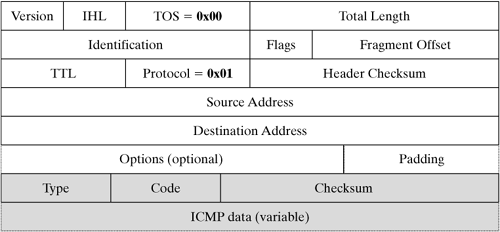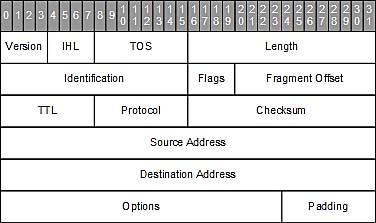Icmp Message Types
icmp message types wallpaperThe data section carries extra information based on the type of the query. The list of common error reporting messages is being given below.
Types of Messages ICMP message are broadly divided into following two categories as under 1.

Icmp message types. Type 2 - Packet Too Big. In the original ICMP version 4 five different error messages are defined which are all described in the original ICMP standard RFC 792. Some important ones which are widely used include.
Because each of the ICMP message headers vary depending on which one is sent we will discuss. With the different IP versions there are two different types of ICMP versions ICMPv4 for IPv4 and ICMPv6 for IPv6. Time exceeded message.
This reference provides information about default ICMP type and Code IDs. The rest of the header specifies each message type. The code field specifies the reason for the particular message type.
The ICMPv6 message consists of a header and the protocol payload. Type 4 - Parameter Problem. The ICMP message contains the following fields.
Internet Control Message Protocol version 6 ICMPv6 Parameters Last Updated 2021-01-27 Available Formats XML HTML Plain text. The following table lists the default ICMP types. Type specifies the type of the message.
The checksum filed specifies the header and data. The first four bytes contains Type Code and Checksum fields in an ICMP header. The values range from 0 to 127 are defined for ICMPv6 and.
ICMP Type Numbers Registration Procedures IESG Approval or Standards Action Reference Note The Internet Control Message Protocol ICMP has many messages that are identified by a type field. ICMP has an appropriate version that coordinates with the IP versions. It is a 16-bit field to detect whether the.
ICMP will take the source IP from the discarded packet and informs to source by sending parameter problem message. It is closely tied to the Internet Protocol IP. ICMP Version 4 ICMPv4 Error Message Types and Formats ICMP error messages are used by routers and hosts to tell a device that sent a datagram about problems encountered in delivering it.
Type 8 bits code 8 bits and checksum 16 bits. Echo8 Echo Reply 0 Destination Unreachable3 Source Quench 4 Redirect 5 Time Exceeded 11 Parameter Problem 12 TimeStamp 13 TimeStamp Reply 14 Information Request 15 Information Reply 16. Type 1 - Destination Unreachable.
Type 3 - Time Exceeded. There are two versions of the Internet Protocol currently active. It is an 8-bit field.
1 Error Reporting Messages. The header contains only three fields. These are messages from which the ICMP reports to errors.
ICMP header has two parts. ICMP is part of the Internet protocol suite as defined in RFC 792ICMP messages are typically used for diagnostic or control purposes or generated in response to errors in IP operations as specified in RFC 1122ICMP errors are directed to the source IP address of the originating packet. First four bytes of ICMP header is shown below.
It is an 8-bit field that defines the subtype of the ICMP message Checksum. The main difference between them is the format of IP address that they specify. Many of the types of ICMP message are now obsolete and are no longer seen in the Internet.
ICMP shares error reporting and devices status by messages. These versions are IPv4 and IPv6. Echo Reply 0 Echo Request 8 Redirect 5 Destination Unreachable 3 Traceroute 30 Time Exceeded 11.
ICMP Header ICMP Message Types. Type 128 - Echo. Destination Unreachable Code 3.
When some fragments are lost in a network then the holding fragment by the router will be droped then ICMP will take source IP from discarded packet and informs to the source of discarded datagram due to. ICMP is used by computers and all types of network devices including network routers which help identify problems and communicate the status of devices on the network. An ICMP redirect message assists in making routing more efficient.
It defines the ICMP message type. The first four bytes are available for all types of ICMP messages. In a case where a host has a.
Messages created by ICMP are divided into 2 categories. Type 0 - Reserved. Identifying default ICMP types.



